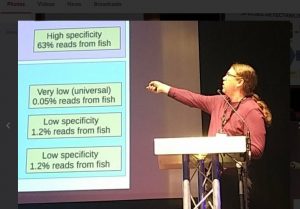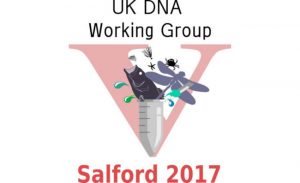We are thrilled to be hosting around 130 international delegates today and yesterday in our New Adelphi building for the 5th UK DNA Working Group Meeting.
The DNA Working Group provides an open and transparent forum for government agencies, academics and wider stakeholders to discuss priorities for DNA based method development, share learning and progress, explore technical challenges, develop collaborative opportunities and leverage research funding effectively.
Professor Stefano Mariani, Dr Allan McDevitt and Dr Owen Wagensteen from the School of Environment & Life Sciences are leading this event as part of the Scientific Committee along with colleagues from the Environment Agency, Marine Scotland and Natural England. The meeting is being run in parallel with the SeaDNA Project and you can keep abreast of the exciting and impactful programme by following #UKDNAWG on Twitter.
Professor Mariani said: “This community has explosively gathered around these new biodiversity assessment methods within the last 5 years. Working with governmental agencies on the ground give us the exciting opportunity to apply fundamental knowledge to real environmental issues; and our group at Salford is now playing a central role in implementing these approaches across a variety of aquatic environments across the globe, from UK coastal waters, to tropical coral reefs and polar seas.”
The two-day sold out event sees keynote speakers from across the globe share their research abstracts on topics such as standardising DNA monitoring methods for regulatory use and the monitoring of marine invasive non-native species using an eDNA approach.
Yesterday, Naiara Guimaraes-Sales from the School of Environment & Life Sciences presented her interesting paper on the Use of Environmental DNA for Fish Biodiversity Assessment in Brazilian Rivers and Dr Owen Wangensteen, Research Assistant in Marine Genomics shared his multi-marker comparative study entitled “Designing Metabarcoding Primers for Fish Biodiversity Assessment.”
Dean of the School of Environment & Life Sciences, Professor Sheila Pankhurst said: “We’re really proud to be hosting this event with such a brilliant programme and speakers. The first day went extremely well and there was a real buzz around the room.”
During break-out sessions, delegates were able to network and view the poster presentations.
You can see the full programme of events here.
We are thrilled to be hosting around 130 international delegates today and yesterday in our New Adelphi building for the 5th UK DNA Working Group Meeting.
The DNA Working Group provides an open and transparent forum for government agencies, academics and wider stakeholders to discuss priorities for DNA based method development, share learning and progress, explore technical challenges, develop collaborative opportunities and leverage research funding effectively.
Professor Stefano Mariani, Dr Allan McDevitt and Dr Owen Wagensteen from the School of Environment & Life Sciences are leading this event as part of the Scientific Committee along with colleagues from the Environment Agency, Marine Scotland and Natural England. The meeting is being run in parallel with the SeaDNA Project and you can keep abreast of the exciting and impactful programme by following #UKDNAWG on Twitter.
Professor Mariani said: “This community has explosively gathered around these new biodiversity assessment methods within the last 5 years. Working with governmental agencies on the ground give us the exciting opportunity to apply fundamental knowledge to real environmental issues; and our group at Salford is now playing a central role in implementing these approaches across a variety of aquatic environments across the globe, from UK coastal waters, to tropical coral reefs and polar seas.”
The two-day sold out event sees keynote speakers from across the globe share their research abstracts on topics such as standardising DNA monitoring methods for regulatory use and the monitoring of marine invasive non-native species using an eDNA approach.
Yesterday, Naiara Guimaraes-Sales from the School of Environment & Life Sciences presented her interesting paper on the Use of Environmental DNA for Fish Biodiversity Assessment in Brazilian Rivers and Dr Owen Wangensteen, Research Assistant in Marine Genomics shared his multi-marker comparative study entitled “Designing Metabarcoding Primers for Fish Biodiversity Assessment.”
Dean of the School of Environment & Life Sciences, Professor Sheila Pankhurst said: “We’re really proud to be hosting this event with such a brilliant programme and speakers. The first day went extremely well and there was a real buzz around the room.”
During break-out sessions, delegates were able to network and view the poster presentations.
You can see the full programme of events here.

